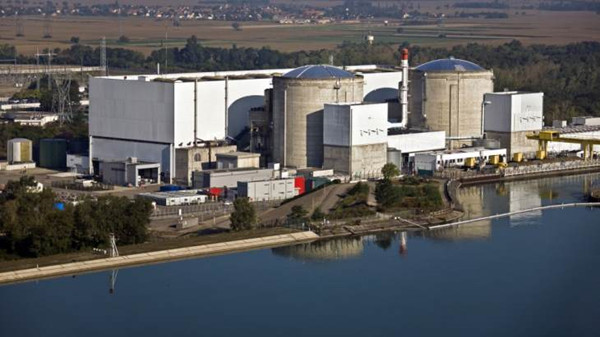France completes closure of Fessenheim plant
French utility EDF on June 29 permanently shut down unit 2 of the Fessenheim nuclear power plant in eastern France as scheduled. Its closure, together with that of unit 1 in February, was necessary under the country's energy transition law before EDF can bring new nuclear capacity online.

The two-unit Fessenheim plant will now enter decommissioning (Image: EDF)
Nuclear accounts for almost 75% of France's power production, but former French president Francois Hollande said he aimed to limit its share of the national electricity generation mix to 50% by 2025, and to close Fessenheim - the country's oldest nuclear power plant - by the end of his five-year term, in May 2017. In June 2014, his government announced capacity would be capped at the current level of 63.2 GWe and be limited to 50% of France's total output by 2025. The French Energy Transition for Green Growth Law, adopted in August 2015, did not call for the shutdown of any currently operating power reactors, but it meant EDF would have to close older reactors in order to bring new ones online.
Fessenheim's two 880 MWe pressurised water reactors have been in operation since 1977 and 1978, respectively. Unit 1 was disconnected from the electricity grid on 22 February, thus ending the reactor's 42 years of low-carbon electricity production. Unit 2 was disconnected from the grid at 11:00pm yesterday, ahead of its scheduled closure today.
EDF began construction of a 1650 MWe EPR unit at Flamanville in December 2007, with commercial operation originally expected in 2013. The loading of fuel into the core of the Flamanville EPR - hot testing of which was completed in February - is now expected at the end of 2022. EDF must therefore shut the equivalent capacity in order to begin operating the Flamanville unit. Under a decree published on 27 March the loading of first fuel must be carried out by April 2024 at the latest.
When he was elected, President Emmanuel Macron promised to respect Hollande's target. However, he has said French reductions in nuclear power must be at a pace that allows the country to retain energy sovereignty. In a November 2018 speech at the Elysee palace to clarify France's energy transition, Macron said 14 reactors of 900 MWe capacity will be shut down by 2035. He said the Fessenheim plant - close to the German border - would close in the spring of 2020.
Under a draft energy and climate bill presented in May last year, France will now delay its planned reduction in the share of nuclear power in its electricity mix to 50% from the current 2025 target to 2035.
The French Nuclear Energy Society (SFEN) has called for the government to establish a monitoring system to measure the climatic, social and economic impacts of Fessenheim's closure in the coming years in order to inform future reactor shutdown decisions. In a statement yesterday, SFEN said: "In light of the current context, it can be said today that the closure of the Fessenheim plant appears to be a decision with terrible consequences for industrial employment, the struggle against global warming, and the resilience of our electrical system."
Researched and written by World Nuclear News
- China Institute of Atomic Energy
- Nuclear Power Institute of China
- Southwestern Institute of Physics
- China Nuclear Power Operation Technology Corporation, Ltd.
- China Nuclear Power Engineering Co., Ltd.
- China Institute for Radiation Protection
- Beijing Research Institute of Uranium Geology (BRIUG)
- China Institute of Nuclear Industry Strategy (CINIS)
- China Nuclear Mining Science and Technology Corporation


